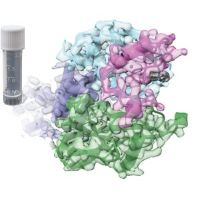Specification
| Description | Recombinant protein from the full-length sequence of Homo sapiens EPH receptor B3 (EPHB3) (NM_004443). |
| Organism | Homo sapiens (Human) |
| Expression Host | Human Cells |
| Tag Info | His or DYKDDDDK. Please contact us if you need further information or require specific designed tag. |
| Purity | Greater than 90% by SDS-PAGE gel |
| Uniprot ID | P54753 |
| Entry Name | EPHB3_HUMAN |
| Gene Names | EPHB3 ETK2 HEK2 TYRO6 |
| Alternative Gene Names | ETK2 HEK2 TYRO6 |
| Alternative Protein Names | Ephrin type-B receptor 3 (EC 2.7.10.1) (EPH-like tyrosine kinase 2) (EPH-like kinase 2) (Embryonic kinase 2) (EK2) (hEK2) (Tyrosine-protein kinase TYRO6) |
| Application | Antigens, Western, ELISA and other in vitro binding or in vivo functional assays, and protein-protein interaction studies; For research & development use only! |
| Buffer | Purified protein formulated in a sterile solution of PBS buffer, pH7.2, without any preservatives |
| Endotoxin | Endotoxin level is < 0.1 ng/µg of protein (<1EU /µg) |
| Length | 998 |
| Molecular Weight(Da) | 110330 |
| Protein Sequence | (The sequence of expressed protein may have some variation from the sequence shown below. Please contact us for the exact sequence.) MARARPPPPPSPPPGLLPLLPPLLLLPLLLLPAGCRALEETLMDTKWVTSELAWTSHPESGWEEVSGYDEAMNPIRTYQVCNVRESSQNNWLRTGFIWRRDVQRVYVELKFTVRDCNSIPNIPGSCKETFNLFYYEADSDVASASSPFWMENPYVKVDTIAPDESFSRLDAGRVNTKVRSFGPLSKAGFYLAFQDQGACMSLISVRAFYKKCASTTAGFALFPETLTGAEPTSLVIAPGTCIPNAVEVSVPLKLYCNGDGEWMVPVGACTCATGHEPAAKESQCRPCPPGSYKAKQGEGPCLPCPPNSRTTSPAASICTCHNNFYRADSDSADSACTTVPSPPRGVISNVNETSLILEWSEPRDLGGRDDLLYNVICKKCHGAGGASACSRCDDNVEFVPRQLGLTERRVHISHLLAHTRYTFEVQAVNGVSGKSPLPPRYAAVNITTNQAAPSEVPTLRLHSSSGSSLTLSWAPPERPNGVILDYEMKYFEKSEGIASTVTSQMNSVQLDGLRPDARYVVQVRARTVAGYGQYSRPAEFETTSERGSGAQQLQEQLPLIVGSATAGLVFVVAVVVIAIVCLRKQRHGSDSEYTEKLQQYIAPGMKVYIDPFTYEDPNEAVREFAKEIDVSCVKIEEVIGAGEFGEVCRGRLKQPGRREVFVAIKTLKVGYTERQRRDFLSEASIMGQFDHPNIIRLEGVVTKSRPVMILTEFMENCALDSFLRLNDGQFTVIQLVGMLRGIAAGMKYLSEMNYVHRDLAARNILVNSNLVCKVSDFGLSRFLEDDPSDPTYTSSLGGKIPIRWTAPEAIAYRKFTSASDVWSYGIVMWEVMSYGERPYWDMSNQDVINAVEQDYRLPPPMDCPTALHQLMLDCWVRDRNLRPKFSQIVNTLDKLIRNAASLKVIASAQSGMSQPLLDRTVPDYTTFTTVGDWLDAIKMGRYKESFVSAGFASFDLVAQMTAEDLLRIGVTLAGHQKKILSSIQDMRLQMNQTLPVQV |
Background
| Function | FUNCTION: Receptor tyrosine kinase which binds promiscuously transmembrane ephrin-B family ligands residing on adjacent cells, leading to contact-dependent bidirectional signaling into neighboring cells. The signaling pathway downstream of the receptor is referred to as forward signaling while the signaling pathway downstream of the ephrin ligand is referred to as reverse signaling. Generally has an overlapping and redundant function with EPHB2. Like EPHB2, functions in axon guidance during development regulating for instance the neurons forming the corpus callosum and the anterior commissure, 2 major interhemispheric connections between the temporal lobes of the cerebral cortex. In addition to its role in axon guidance plays also an important redundant role with other ephrin-B receptors in development and maturation of dendritic spines and the formation of excitatory synapses. Controls other aspects of development through regulation of cell migration and positioning. This includes angiogenesis, palate development and thymic epithelium development for instance. Forward and reverse signaling through the EFNB2/EPHB3 complex also regulate migration and adhesion of cells that tubularize the urethra and septate the cloaca. Finally, plays an important role in intestinal epithelium differentiation segregating progenitor from differentiated cells in the crypt. {ECO:0000269|PubMed:15536074}. |
| Pathway | |
| Protein Families | Protein kinase superfamily, Tyr protein kinase family, Ephrin receptor subfamily |
| Tissue Specificity | Ubiquitous. |
QC Data
| Note | Please contact us for QC Data |
| Product Image (Reference Only) |  |

